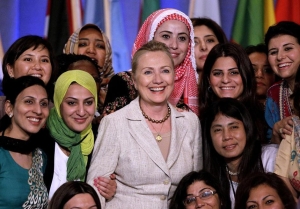Experts Answer: Women in Public Diplomacy
Women around the world are increasingly taking on more high-profile leadership roles in foreign affairs and public diplomacy. Similarly, public diplomacy priorities are increasingly focused on women and women’s issues. From your perspective, how has this shift towards the importance of women impacted your country’s public diplomacy priorities or affected your country’s public?
“Women have been at the forefront of the UAE’s public diplomacy efforts. They form two thirds of government sector workers and make up twenty percent of the diplomatic corps. Most notably, there are four female cabinet ministers. They help design, shape and drive an impressive effort that focuses not only on promoting the UAE as a tolerant and open society, but also prioritizes humanitarian activities. Most recently, the UAE helped transport Malala, the Afghan girl shot by the Taliban for treatment in the UK, because the UAE believes in every girl’s right to education.”
Nora Abusitta, Advisor to the Ambassador from the United Arab Emirates, Washington, D.C.
“Public diplomacy is a priority within the Foreign Service of Norway. We think new ways of communicating, expanding networks, and creating arenas for interchange are essential to obtain a deeper understanding of global affairs, thus making us better global players. We want women and women’s issues to rank high on the Norwegian foreign policy agenda. I think our women diplomats have influenced our government on this, and because of it, strong alternative voices more naturally have been included in our decision-making. Next year Norway celebrates 100 years since women got their voting rights. We will use this occasion to highlight the history of women’s rights in Norway, as an inspiration, hopefully, to other pioneers that still are so essential to bring the female cause forward.”
Mrs. Mona Elisabeth Brøther, Norwegian Ambassador to Canada
“Despite the fact that I agree with your statement this shift is still too slow if we consider the speed in which other issues are developing in the 21st century. Areas considered “soft,” such as culture and education, are also being taken over by women as leaders. These sectors are not generally regarded as influential-decision making areas. In my country, Catalonia (a nation with a history, government, language and culture going back more than a thousand years), this is still an issue to be resolved. Despite women holding 41% of the seats in the Catalan parliament, we still do not have an acceptable percentage of women in top government positions. To quote Roseanne Barr: “The thing that women have yet to learn is nobody gives you power. You just take it.””
Roser Clavell, Secretary General of DIPLOCAT, Public Diplomacy Council of Catalonia and former Deputy Minister for Foreign Affairs to the Catalan Government.
To read the full submission, click here.
“In recent years, investing in women has become a standard in the public and private sectors. From international development agencies to multinational corporations, those in leadership and policymaking positions are devoting time and resources to advancing women and leveraging their unique contribution. While there remains much work to be done, I think we’re seeing an important shift in perception, one that’s reinforced by the leadership of women such as Secretary Hillary Clinton and Ambassador Melanne Verveer, who will focus on women not only because it’s the fair thing to do, but because it’s the smart thing to do.”
Alyse Nelson, Vital Voices President and CEO
“Having a woman in a leadership role in foreign affairs does not guarantee women informing policy. Other than constantly pointing out that Israel had a woman prime minister in the 1970’s and that women serve in the army, women’s issues have not been at all relevant to Israel’s public diplomacy efforts. Even though there are plenty of examples of women empowering each other across all ethnic and religious lines, for now, the Israeli foreign ministry has chosen to ignore women’s issues and empowerment.”
Yael Swerdlow and Illana Shoshan, co-founders, Women’s Empowerment Foundation
To read the full submission, click here.
Tags
Issue Contents
Most Read CPD Blogs
-
January 29
-
January 20
-
January 28
-
January 2
-
January 8
Visit CPD's Online Library
Explore CPD's vast online database featuring the latest books, articles, speeches and information on international organizations dedicated to public diplomacy.









Add comment